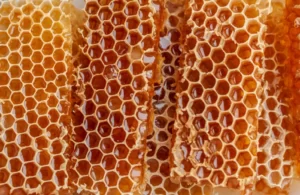Table of Contents
Eczema is a group of conditions that cause inflammation, itching, and soreness of the skin. While there is no cure for eczema, it is highly treatable. Manuka honey has gained attention as a potential alternative treatment for eczema due to its various properties, including antimicrobial, anti-inflammatory, and antioxidant effects. In this article, we will explore the potential benefits of using Manuka honey for eczema and how it works. We will also discuss the risks involved and other home remedies that may help alleviate eczema symptoms.
What is Eczema?
Eczema is characterized by discolored, inflamed skin that is itchy, dry, and sensitive. Other symptoms may include oozing and crusting, areas of swelling, and the development of leathery, rough patches of skin. While there is no known cure for eczema, it can be managed effectively with proper treatment.
Manuka Honey for Eczema: Potential Benefits
Research suggests that Manuka honey may have several properties that can alleviate eczema symptoms. These properties include antimicrobial, anti-inflammatory, and antioxidant effects. Additionally, Manuka honey has been found to promote tissue healing by stimulating macrophages, which are responsible for removing dead cells and promoting the production of new ones. However, it is important to note that more research is needed to determine the effectiveness of Manuka honey as a treatment for eczema, as there are currently very few studies on this topic.
A small study conducted in 2017 investigated the effects of applying Manuka honey to atopic dermatitis lesions. The study participants showed improved lesions and reduced inflammation, but the study had a small sample size of only 14 individuals. Another study from the same year showed that honey eardrops led to decreased symptoms of eczema, but this study did not include a control group.
How Does Manuka Honey Work for Eczema?
When using Manuka honey for eczema, it is important to use medical-grade honey that is filtered and free of contaminants. Medical-grade Manuka honey is commonly used as a topical ointment and in dressings for surface wounds and burns due to its wound healing properties. This honey stimulates an inflammatory response, creating a protective barrier between the skin and the environment, which can be beneficial for individuals with eczema.
Manuka Honey’s Antimicrobial Properties
Scientists are currently exploring the medicinal properties of Manuka honey, especially as antibiotic resistance becomes a growing concern worldwide. Honey, including Manuka honey, has the potential to be an alternative treatment for antibiotic-resistant infections. Manuka honey contains natural chemicals that give it increased antimicrobial activity compared to other types of honey. These chemicals include methylglyoxal, dihydroxyacetone, and other active components.
- Methylglyoxal: This natural chemical found in Manuka honey results in increased antimicrobial activity.
- Dihydroxyacetone: Found only in the nectar of the Manuka flower, this chemical converts to methylglyoxal during the honey-making process.
- Other active components: Manuka honey also contains other components with antimicrobial properties, such as hydrogen peroxide, acidic pH level, bee-defensin-1, and a hyper-osmolality effect.
How to Use Manuka Honey for Eczema
To use Manuka honey as a treatment for eczema, it is recommended to follow these steps:
- Apply a thin layer of medical-grade Manuka honey to the affected area in the evening using clean hands.
- Cover the area with a bandage or gauze to keep the honey in place.
- Leave the dressing in place overnight.
- Gently remove the dressing in the morning and clean the area.
It is important to note that most studies on the medical benefits of Manuka honey have been conducted in vitro, meaning they were done in a controlled setting such as a petri dish or test tube. Therefore, the results of these studies may not necessarily translate to real-life use by individuals.
Risks and Safety of Manuka Honey for Eczema
One limiting factor of Manuka honey is its price, as it can be quite expensive. When purchasing Manuka honey, it is essential to ensure that it is genuine medical-grade honey. Look for the Unique Manuka Factor (UMF) mark on the product, which indicates that the honey comes from licensed producers, beekeepers, and exporters. Additionally, pay attention to the number next to the UMF mark, as it indicates the key markers for Manuka honey, such as methylglyoxal and dihydroxyacetone. A UMF of 10 or above is considered best.
Other Home Remedies for Eczema
In addition to Manuka honey, there are other home remedies that may help alleviate eczema symptoms. These include:
- Apple cider vinegar: While there is no research confirming its effectiveness, apple cider vinegar is believed to help with eczema by fighting bacteria and balancing the skin’s acid levels. However, caution should be exercised as vinegar may damage soft tissue.
- Coconut oil: This thick oil can moisturize dry skin and reduce inflammation, potentially easing eczema symptoms.
- Tea tree oil: Extracted from the leaves of the Melaleuca alternifolia tree, tea tree oil has antibacterial, anti-inflammatory, and wound-healing properties, which may help reduce eczema symptoms.
- Colloidal oatmeal: Bathing with colloidal oatmeal or using colloidal oatmeal lotion may help ease eczema symptoms. Colloidal oatmeal has potential skin-healing properties and is also an antioxidant with anti-inflammatory effects.
When to Consult a Doctor
It is important to seek medical advice if:
- Over-the-counter (OTC) treatments and home remedies have been ineffective in managing eczema symptoms.
- Lesions appear infected.
- Lesions cover a large area of the body.
- Eczema is significantly disruptive to daily life.
In conclusion, Manuka honey shows promise as a potential treatment for eczema due to its various properties, including antimicrobial, anti-inflammatory, and antioxidant effects. However, more research is needed to determine its effectiveness. When using Manuka honey for eczema, it is important to choose medical-grade honey and follow proper application methods. Additionally, other home remedies such as apple cider vinegar, coconut oil, tea tree oil, and colloidal oatmeal may also help alleviate eczema symptoms. If eczema symptoms persist or worsen, it is important to consult a healthcare professional for proper diagnosis and treatment.



